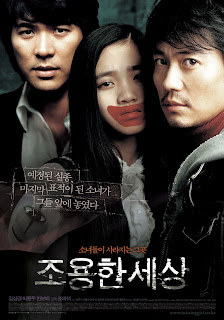 This is the feature film debut of actress Do-yeon Jeon who went on to win best actress by unanimous decision for her role in Secret Sunshine at the 2007 Cannes Film Festival. If you are a fan of her work you should definitely see The Contact. It's not a great film but her performance in it makes it more than worthwhile.
This is the feature film debut of actress Do-yeon Jeon who went on to win best actress by unanimous decision for her role in Secret Sunshine at the 2007 Cannes Film Festival. If you are a fan of her work you should definitely see The Contact. It's not a great film but her performance in it makes it more than worthwhile.The Contact is the story of two people, each involved in their own forlorn love triangles, who meet on the Internet and slowly build a friendship acting as advice-givers to one another. They share the same space onscreen several times without knowing it because neither one knows what the other looks like. Comparisons have been made to You've Got Mail which came out a year after The Contact, but beyond the, uh ... internet connection, there's not much else in common. You've Got Mail was a romantic comedy, which suited the actors starring in it, while this film sports a somber quality, more suited to the actors starring in it. Do-yeon Jeon has a wistful glamor about her that comes from the inside, and Suk-kyu Han, who plays the male lead, has a "woe is me" air about him that is not the least bit amusing and comes off as a little introspectively self-important.
There is about three minutes of (in)-action just before the end of this film in which you will hate Han's character for the decision he seems to be making and the effect it has on Jeon's character. If there were a little more plot substance to account for his inaction, well ... there'd be a little more plot substance.
It's substance that this film lacks in the overall, especially in Han's character. He's a radio show producer who is always being reprimanded for inserting 20 minute songs into the playlists. He receives an anonymous package one day that contains a Velvet Underground album which becomes the link between our protagonists. Han is convinced his long lost love sent it to him but doesn't know why. He plays "Pale Blue Eyes" from the album and receives a request via the internet the following night for the same song, and that's how he connects with Jeon.
Han contacts the person, Jeon, who made the request, hoping it is his old flame or someone who knows her and made the request on her behalf. Jeon lies and says she knows the person Han is looking for. As that little fiction plays out, so do the characters' back stories.
Han's long lost love broke up with him many years ago and fell for his best friend, an army buddy. When the army buddy is killed in an accident, Han thinks the girl will come running back to him, (now that the competition is dead!) but Han is somehow implicated in the cause of the accident and a tangled web is weaved. Han also deals with internal office politics complicated by a beautiful woman who becomes his main writer for the radio show and an emotional distraction.
Jeon, on the other hand, marches forward emotionlessly after her unrequited true love falls for her best friend and roommate instead of her. While Jeon's love triangle plays out a little more interestingly than Han's, it's the emotionlessness of her character, which isn't cold and unkind, but sympathetic and sad, manifested in her inability to cry, that we come to focus on. In a train wreck of plot development, Jeon is driving her car the night Han first plays "Pale Blue Eyes." She witnesses a terrible accident, but it is the song, not the tragedy, that almost makes her cry. Hence her request to hear the song again. She wants to cry.
The Korean film's plot was made more complicated to this viewer, as train tickets, movie stubs, and other written materials are passed around without translation. Even without a good story or all the facts to go on, I was swept away by Jeon's portrayal of a woman who wants to find love but must discover first what it might look like. She's a tremendously skilled and nuanced actress. I recommend this film to anyone looking for a night of romance rental theater or a romantic character-study.
★★★★































